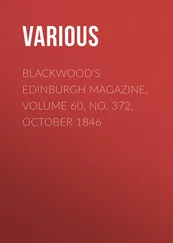Various - Blackwood's Edinburgh Magazine, No. CCCXXXVI. October, 1843. Vol. LIV.
Здесь есть возможность читать онлайн «Various - Blackwood's Edinburgh Magazine, No. CCCXXXVI. October, 1843. Vol. LIV.» — ознакомительный отрывок электронной книги совершенно бесплатно, а после прочтения отрывка купить полную версию. В некоторых случаях можно слушать аудио, скачать через торрент в формате fb2 и присутствует краткое содержание. Издательство: Иностранный паблик, Жанр: foreign_antique, periodic, foreign_edu, на английском языке. Описание произведения, (предисловие) а так же отзывы посетителей доступны на портале библиотеки ЛибКат.
- Название:Blackwood's Edinburgh Magazine, No. CCCXXXVI. October, 1843. Vol. LIV.
- Автор:
- Издательство:Иностранный паблик
- Жанр:
- Год:неизвестен
- ISBN:нет данных
- Рейтинг книги:5 / 5. Голосов: 1
-
Избранное:Добавить в избранное
- Отзывы:
-
Ваша оценка:
- 100
- 1
- 2
- 3
- 4
- 5
Blackwood's Edinburgh Magazine, No. CCCXXXVI. October, 1843. Vol. LIV.: краткое содержание, описание и аннотация
Предлагаем к чтению аннотацию, описание, краткое содержание или предисловие (зависит от того, что написал сам автор книги «Blackwood's Edinburgh Magazine, No. CCCXXXVI. October, 1843. Vol. LIV.»). Если вы не нашли необходимую информацию о книге — напишите в комментариях, мы постараемся отыскать её.
Blackwood's Edinburgh Magazine, No. CCCXXXVI. October, 1843. Vol. LIV. — читать онлайн ознакомительный отрывок
Ниже представлен текст книги, разбитый по страницам. Система сохранения места последней прочитанной страницы, позволяет с удобством читать онлайн бесплатно книгу «Blackwood's Edinburgh Magazine, No. CCCXXXVI. October, 1843. Vol. LIV.», без необходимости каждый раз заново искать на чём Вы остановились. Поставьте закладку, и сможете в любой момент перейти на страницу, на которой закончили чтение.
Интервал:
Закладка:
"When, therefore, we conclude, from the death of John and Thomas, and every other person we ever heard of in whose case the experiment had been fairly tried, that the Duke of Wellington is mortal like the rest, we may, indeed, pass through the generalization, All men are mortal, as an intermediate stage; but it is not in the latter half of the process—the descent from all men to the Duke of Wellington—that the inference resides. The inference is finished when we have asserted that all men are mortal. What remains to be performed afterwards is merely deciphering our own notes.
"Archbishop Whately has contended, that syllogizing, or reasoning from generals to particulars, is not, agreeably to the vulgar idea, a peculiar mode of reasoning, but the philosophical analysis of the mode in which all men reason, and must do so if they reason at all. With the deference due to so high an authority, I cannot help thinking that the vulgar notion is, in this case, the more correct. If, from our experience of John, Thomas, &c. who once were living, but are now dead, we are entitled to conclude that all human beings are mortal, we might surely, without any logical inconsequence, have concluded at once, from those instances, that the Duke Wellington is mortal. The mortality of John, Thomas, and Company, is, after all, the whole evidence we have for the mortality of the Duke of Wellington. Not one iota is added to the proof by interpolating a general proposition. Since the individual cases are all the evidence we can possess; evidence which no logical form into which we choose to throw it can make greater than it is; and since that evidence is either sufficient in itself, or, if insufficient for one purpose, cannot be sufficient for the other; I am unable to see why we should be forbidden to take the shortest cut from these sufficient premisses to the conclusion, and constrained to travel the 'high priori road' by the arbitrary fiat of logicians. I cannot perceive why it should be impossible to journey from one place to another, unless 'we march up a hill and then march down again.' It may be the safest road, and there may be a resting-place at the top of the hill, affording a commanding view of the surrounding country; but for the mere purpose of arriving at our journey's end, our taking that road is perfectly optional: it is a question of time, trouble, and danger.
"Not only may we reason from particulars to particulars, without passing through generals, but we perpetually do so reason. All our earliest inferences are of this nature. From the first dawn of intelligence we draw inferences; but years elapse before we learn the use of general language. The child who, having burnt his fingers, avoids to thrust them again into the fire, has reasoned or inferred, though he has never thought of the general maxim—fire burns. He knows from memory that he has been burnt, and on this evidence believes, when he sees a candle, that if he puts his finger into the flame of it, he will be burnt again. He believes this in every case which happens to arise; but without looking, in each instance, beyond the present case. He is not generalizing; he is inferring a particular from particulars.—Vol. I. p. 244.
"From the considerations now adduced, the following conclusions seem to be established:—All inference is from particulars to particulars: General propositions are merely registers of such inferences already made, and short formulæ for making more: The major premiss of a syllogism, consequently, is a formula of this description; and the conclusion is not an inference drawn from the formula, but an inference drawn according to the formula: the real logical antecedent, or premisses being the particular facts from which the general proposition was collected by induction . * * *
"In the above observations, it has, I think, been clearly shown, that although there is always a process of reasoning or inference where a syllogism is used, the syllogism is not a correct analysis of that process of reasoning or inference; which is, on the contrary, (when not a mere inference from testimony,) an inference from particulars to particulars; authorized by a previous inference from particulars to generals, and substantially the same with it: of the nature, therefore, of Induction. But while these conclusions appear to me undeniable, I must yet enter a protest, as strong as that of Archbishop Whately himself, against the doctrine that the syllogistic art is useless for the purposes of reasoning. The reasoning lies in the act of generalisation, not in interpreting the record of that act; but the syllogistic form is all indispensable collateral security for the correctness of the generalisation itself."—P. 259.
By this explanation we are released from the dilemma into which the syllogistic and non-syllogistic party had together thrown us. We can acknowledge that the process of reason can be always exhibited in the form of a syllogism, and yet not be driven to the strange and perplexing conclusion that our reasoning can never conduct us to a new truth, never lead us further than to admit in one shape what we had already admitted in another. We have, or may have, it is true, a major in all our ratiocination, implied, if not expressed, and are so far syllogistic; but then the real premiss from which we reason is the amount of experience on which that major was founded, to which amount of experience we, in fact, made an addition in our minor , or conclusion.
But while we accept this explanation, and are grateful for the deliverance it works for us, we must also admit, (and we are not aware that Mr Mill would controvert this admission,) that there is a large class of cases in which our reasoning betrays no reference to this anterior experience, and where the usual explanation given by teachers of logic is perfectly applicable; cases where our object is, not the discovery of truth for ourselves, but to convince another of his error, by showing him that the proposition, which in his blindness or prejudice he has chosen to contradict, is part and parcel of some other proposition to which he has given, and is at all times ready to give, his acquiescence. In such cases, we frequently content ourselves with throwing before him this alternative—refuse your major , to which you have again and again assented, or accept, as involved in it, our minor proposition, which you have persisted in controverting.
It will have been gathered from the foregoing train of observation, that, in direct contradistinction to Archbishop Whately, who had represented induction (so far as it consisted of an act of ratiocination) as resolvable into deductive and syllogistic reasoning, our author has resolved the syllogism, and indeed all deductive reasoning whatever, ultimately into examples of induction. In doing this, he is encountered by a metaphysical notion very prevalent in the present day, which lies across his path, and which he has to remove. We allude to the distinction between contingent and necessary truths; it being held by many philosophical writers that all necessary and universal truths owe their origin, not to experience (except as occasion of their development,) and not, consequently, to the ordinary process of induction, but flow from higher sources—flow immediately from some supreme faculty to which the name of reason has by some been exclusively appropriated, in order to distinguish it from the understanding, the faculty judging according to sense. We will pause a while upon this topic.
Contingent and Necessary Truths. —Those who have read Mr Whewell's treatise on the Philosophy of the Inductive Sciences , will remember that there is no topic which that author labours more sedulously to inculcate than this same distinction between contingent and necessary truths; and it is against his statement of the doctrine in question, that Mr Mill directs his observations. Perhaps the controverted tenets would have sustained a more equal combat under the auspices of a more practised and more complete metaphysician than Mr Whewell; but a difficulty was probably experienced in finding a statement in any other well-known English author full and explicit. Referring ourselves to Mr Whewell's volumes for an extract, in order to give the distinction here contended against the advantage of an exposition in the words of one who upholds it, we are embarrassed by the number which offer themselves. From many we select the following statement:—
Читать дальшеИнтервал:
Закладка:
Похожие книги на «Blackwood's Edinburgh Magazine, No. CCCXXXVI. October, 1843. Vol. LIV.»
Представляем Вашему вниманию похожие книги на «Blackwood's Edinburgh Magazine, No. CCCXXXVI. October, 1843. Vol. LIV.» списком для выбора. Мы отобрали схожую по названию и смыслу литературу в надежде предоставить читателям больше вариантов отыскать новые, интересные, ещё непрочитанные произведения.
Обсуждение, отзывы о книге «Blackwood's Edinburgh Magazine, No. CCCXXXVI. October, 1843. Vol. LIV.» и просто собственные мнения читателей. Оставьте ваши комментарии, напишите, что Вы думаете о произведении, его смысле или главных героях. Укажите что конкретно понравилось, а что нет, и почему Вы так считаете.












